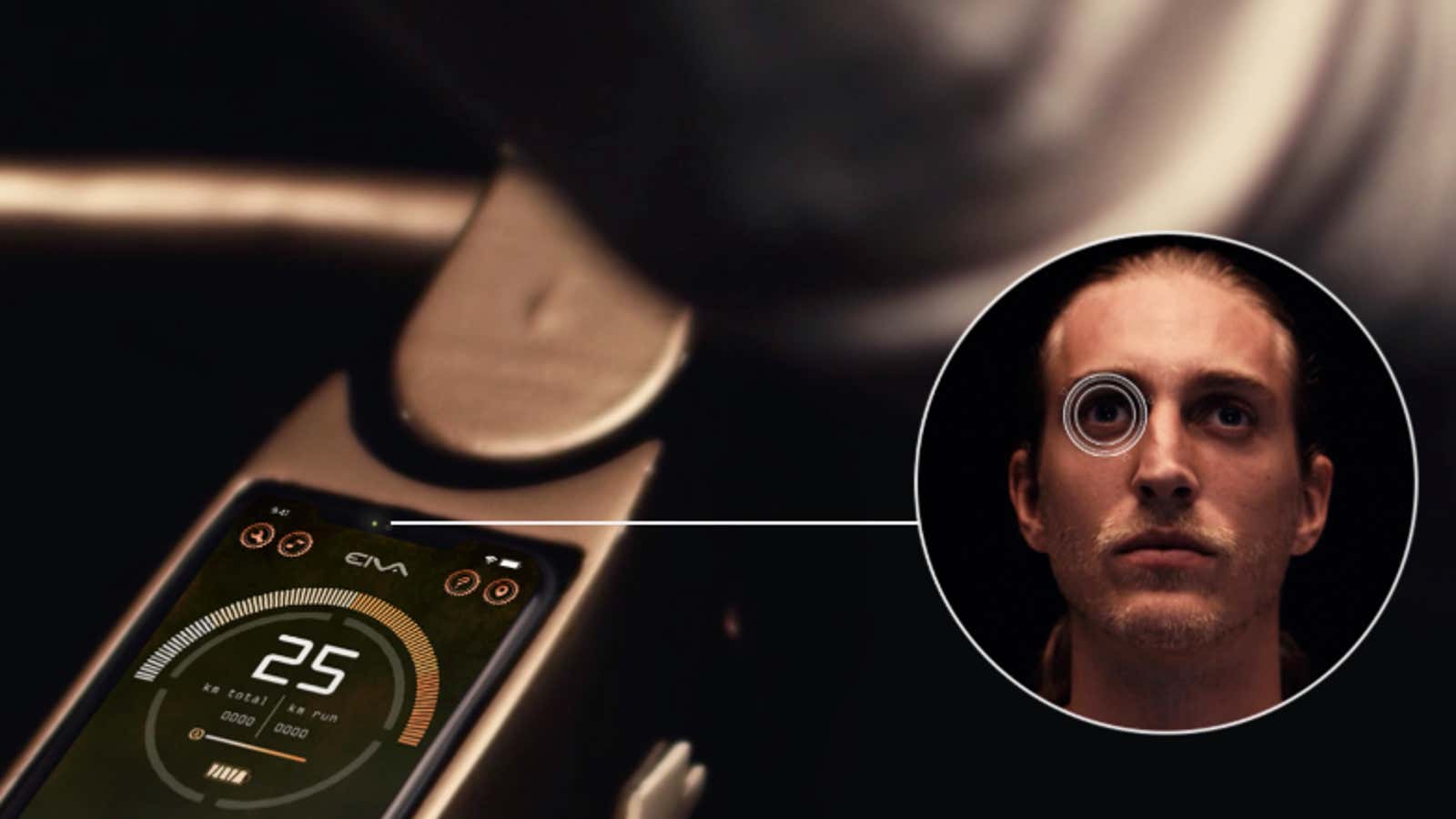Prospective owners of the Rayvolt X One, a sleek e-bike that can reach speeds of up to 28 mph, won’t have to worry about bike thieves. The bike is equipped with an Android-powered touchscreen that uses facial recognition, only unlocking the bike if it detects the owner’s face. The e-bike company has surpassed its fundraising goal on Indiegogo and plans to start shipping the X One in June 2020.
Rayvolt wants to use facial recognition for a host of other features on the bike. Founder Mathieu Rauzier told Quartz that by using facial recognition, the X One could potentially recognize users’s custom settings, such as acceleration rate and maximum speed. The X One will also rely on facial recognition for commands while riding: A slight head bob, for example, will activate the bike’s turn signal.
“It simply makes the user experience more pleasant,” Rauzier said.
Rayvolt is currently working with a video-processing company to integrate facial identification into the X One’s app. When asked about protecting the privacy of users, Rauzier said that all the data would only be saved in the user’s app, and not uploaded anywhere else.
The X One is just one of the many new products containing facial scanning software that will hit the market in the next few years. Numerous automakers, including Jaguar, BMW, Subaru, Ford, Lexus, Tesla, Porsche, Mercedes-Benz and Volkswagen are currently using or planning to use facial recognition in upcoming models. Cars with keyless entry, like BMW’s M Next, will automatically unlock as owners approach the vehicle. Even most smartphones, including the last few generations of Apple’s iPhone and Samsung’s Galaxy phones, offer facial-recognition software. It’s being rolled out for airlines, and banks, and even on public transit.
Even as US cities like Portland, and Denver (as well as the US Congress) weigh restricting the use of facial recognition by law enforcement (or in the case of San Francisco and Somerville, Massachusetts, already have), the software is becoming more prevalent in consumer products. While the safety and privacy concerns of the technology are still being openly questioned and linked with the rise of increasingly authoritarian governments, facial recognition is also becoming normalized as it shows up in hundreds of new apps, devices, and products.
According to a research report by market intelligence firm MarketsandMarkets, the global facial-recognition market is expected to grow from $3.9 billion in 2019 to $7 billion in 2024. Much of the growth is expected to come from data security initiatives by government agencies (such as the US Customs and Border Protection’s screening of passengers), as well as smartphones and tablets that utilize the software.
The facial-recognition software on the X One, which will cost between $3,999 to $4,399, is likely to give some owners some peace of mind. Both Mastercard and Visa, as well as mobile wallets like Apple Pay, Google Pay, and Samsung Pay, now deploy facial recognition as an added layer of security. Iberia Airlines this month launched a pilot project that essentially allows passengers to use their face as their boarding pass. Several other airlines, including American Airlines, JetBlue, Delta, KLM, and British Airways have already rolled out facial recognition boarding passes for select routes. Delta is working on offering the service to international passengers in Seattle by the end of 2019.
Ironically enough, Americans are more trusting of law enforcement than companies when it comes to facial recognition. A study by the Pew Research Center found that 56% of Americans trusted law enforcement to use facial recognition responsibly. Only 36% said they trusted tech companies to use it responsibly, and 17% trusted advertisers.
As it stands, very few laws on facial recognition exist in the books. The European Union only this year began exploring laws to limit facial recognition. In China, where the use of facial recognition is much more common, the technology is meeting some resistance. A law professor recently sued a Chinese wildlife park for subjecting visitors to facial scans. “I think it is OK and, to some extent, necessary for government agencies, especially police departments, to implement this technology, because it helps to maintain public security,” Guo Bing, a professor at Zhejiang University of Sci-Tech, said in an interview with Beijing News. “But it’s still worth discussing when it comes to the legitimacy and legality of using the technology.”
Meanwhile, privacy critics argue that given how quickly facial recognition is proliferating both public and private life and how little oversight exists to curtail it, there’s little reason to trust it at all.
